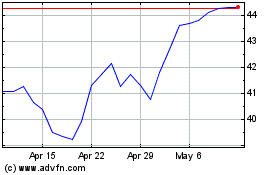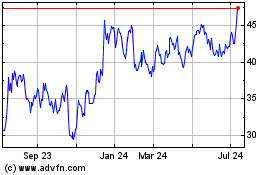Fears Of A Slower US Recovery Hit Regional Bank Stocks
March 15 2011 - 2:16PM
Dow Jones News
The impact of the Japanese natural and nuclear disasters on the
world economy damped investors' enthusiasm Tuesday for the stocks
of U.S. banks.
Shares of regional banks were falling Tuesday, reflecting a
growing concern among investors that demand for new loans may not
improve revenue as much as some on Wall Street are hoping. Though
some analysts argue that banks' improved capital will still allow
them to raise dividends or buy back stock.
The disruptions to the world's third-largest economy, and their
potential ripple effect on a U.S. recovery, follow rising oil
prices and political upheaval in north Africa and the Middle East.
"Anything hurting the U.S. recovery puts pressure on bank stocks,"
said Peter Winter, an analyst with BMO Capital Markets.
Comerica Inc. (CMA) was among the worst performers in the
regional bank group, falling 2.3% in recent trading, to $37.43. The
Dallas bank is mainly a commercial lender, a type of lending
dependent on growing businesses.
PNC Financial Services Group Inc. (PNC) was off 1.6%, to $61.54;
and Zions Bancorporation (ZION) fell 2%, to $22.63; while they are
two very different banks, both are thought to be able to derive
much of their future revenue from the economic recovery in the
U.S.
Midwestern commercial lenders Fifth Third Bancorp (FITB) and
KeyCorp (KEY) fell more than 4% before the market opened and were
recently down around 2%.
Consumer lenders like Capital One Financial Corp. (COF) and
Astoria Financial Corp. (AF) are doing better; Capital One was up
2.6%, to $50.74, after reporting shrinking monthly delinquencies on
credit card loans, and Astoria is off 0.4%, to $13.73.
"The fear meter definitely swung hard in one direction" Tuesday
morning, said Terry J. McEvoy, an analyst with Oppenheimer &
Co. "Investors are taking money off the table until it is clearer
what this means for loan growth" and credit quality.
Bankers have said in recent months that demand from businesses
for new loans picked up in December, giving investors hope the
economic recovery would soon impact bank earnings--one reason why
bank stocks rose. The KBW bank index was up more than 6% from
January to mid-February, when concerns about the political upheaval
in North Africa and the Middle East damped economic growth
expectations. On Tuesday, the index fell 1.6%, compared to a 1.7%
decline of the Standard & Poor's 500 Index.
But loan demand has remained timid. "Even excluding Japan, it
looks that the economic recovery is slower than thought," said
Joseph Fenech of Sandler O'Neill & Partners. A slower economic
recovery could mean the improvement in delinquent loans will also
slow.
In addition, momentum trading moves like the one that hit the
market Tuesday morning usually have a big impact on bank stocks.
"Regional bank betas are pretty high following the financial
crisis," said Frederick Cannon, the chief equity strategist at
Keefe, Bruyette & Woods Inc. Beta refers to the tendency for
certain stocks to move more or less than the stock market in
general; high beta stocks tend to move up and down more than broad
market indices.
Large banks are also falling Tuesday, with Citigroup Inc. (C)
and Bank of America Corp. (BAC) down 2.5%, and 2.2%, respectively,
to $4.42 and $13.92. However, Wells Fargo & Co. (WFC), also a
big commercial lender but best known for its retail banking
business, was off only 0.7%, to $31.88.
So analysts argue the sell-off in bank stocks, tied simply to a
slower--or perhaps even stalled--recovery, is overdone. Banks have
sufficient capital to increase their dividends and buy back their
shares, and acquisitions will pick up, Fenech said, giving
investors reason to continue to invest in banks.
-By Matthias Rieker, Dow Jones Newswires; 212-416-2471;
matthias.rieker@dowjones.com
Zions Bancorporation NA (NASDAQ:ZION)
Historical Stock Chart
From Mar 2024 to Apr 2024

Zions Bancorporation NA (NASDAQ:ZION)
Historical Stock Chart
From Apr 2023 to Apr 2024
